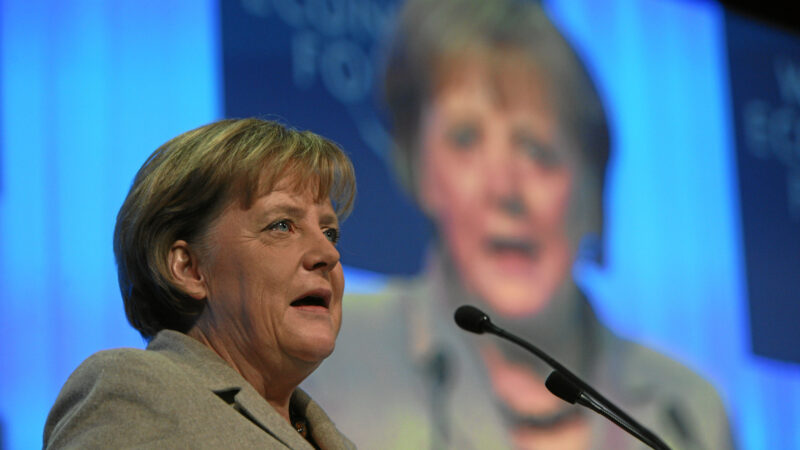Why 2015 is going to be the beginning of the end for Merkel

I’ve long been fascinated by the German politics, and how German politics is perceived beyond Germany. One aspect of this is how Merkel is described as the strong leader, internationally – a picture that is generally not reflected within Germany itself. For all their fascinating insight, pieces like the long profiles in The New Yorker and The Dish fall somewhat into this trap. Putting this another way, the temptation is to over-estimate the power of Merkel within the German political system, and not pay adequate attention to the other players in her three governments to date.
I’ve however come to the opinion that 2015 is going to be the beginning of the end of the Merkel project (if that’s the right word for it – predominance, perhaps?), even if that seems to be going against the grain of popular opinion.
The first observation is that it is for governments to lose elections, not for oppositions to win them. Merkel, in grand coalition with the SPD, commands 80% of the seats in the Bundestag, rendering this point more important than ever – the opposition can barely land a blow. Merkel is only going to decline if she, and her government, begin to lose their grip…
…which leads me to how this is happening, the second point. A major error has been unfolding these past few days, with extraordinarily patronising comments from Merkel and Schäuble, since tempered somewhat, about Germany preparing to let Greece leave the Euro if that country does not stick to its austerity programmes. That this has been so obviously raised before Greece’s 25th January general election looks like unacceptable pressure on Greece, in addition to years of austerity and years of recession. Sigmar Gabriel has also waded into this debate, saying Germany cannot be blackmailed, when it looks like the blackmailing is going very much in the opposite direction. Hollande may be weak, the UK may be marginal, and Renzi as yet untested, but there is a limit to how much the rest of the EU is going to take – and Austria’s Faymann, it seems, has been quick to express that.
While Germany may be the Eurozone’s economic powerhouse, the motor is nevertheless spluttering a bit – my third point. That 1% growth in 2015 is considered to be progress by Jens Weidmann says a lot, and even The Economist has come to the conclusion that Germany would be better investing in infrastructure than seeking to balance its budget. The danger of deflation remains real. Merkel might be a fine leader for when the economy is doing OK – playing the role of the frugal matron of the country appealing to Baden-Württemberg householders paranoid about debt, but I doubt this can persist if Germany’s own performance stalls, or Germany’s own policies force further woes on the Eurozone, and that drags German economic growth lower still.
The fourth issue is the lack of a political project to really hold the coalition together. Most of the main components of the Koalitionsvertrag (see Die Zeit’s excellent summary in German here) have already been implemented (minimum wage, dual citizenship, rent controls, change to university financing), and the only major outstanding one – tolls for non-German cars on German motorways (the so-called Pkw-Maut) – is fraught with difficulties, as the current plans are contrary to EU law, as Juncker has already warned Merkel.
The problem is that the transport minister (responsible for the Pkw-Maut) is Alexander Dobrindt, and he’s from Merkel’s CDU’s Bavarian ‘partners’, the CSU. They are the ones who have also called for German to be spoken at home, and whose rhetoric has become so populist that they are included in Buzzfeed quizzes. This then is the fifth issue for Merkel to contend with – not only the populism of the CSU, but also the appropriate reaction to Alternative für Deutschland (AfD), and Pegida – who have introduced a populist, xenophobic and EU-hostile aspect into German politics, most notably in the traditional heartland of the CDU, Saxony. Merkel has been reasonably tough in her critique of Pegida, but a comprehensive way to deal with these nuisances to the right of her party has so far eluded her and the CDU.
Right then, there you have it: time, Greece, the economy, the lack of a political project, and the rise of populism are going to contribute to the weakening of Merkel. By all means tell me why this is all wrong in the comments!
One of the weird things that occurred regularly in 2013 when I was discussing whom to vote for with friends was that some of them, even though they were critical of Merkel when it came to the “Innenpolitik” said they´d vote for her because they believed her to be a strong leader capable of contributing to a resolution of the many issues on a european level.
And since the tide there seems to turn slowly – or at least that is what I hope I am observing – you might be quite right.
Your are an idiot Worth! Merkel will be dictator of Europe for many year to come!